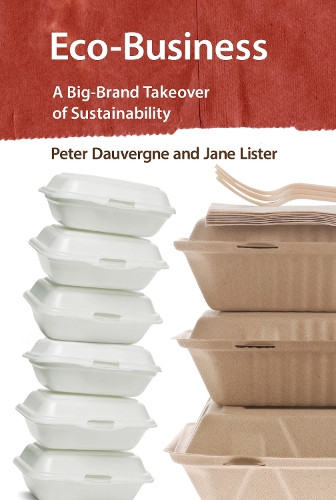
Eco-Business: A Big-Brand Takeover of Sustainability
(Paperback)
Publishing Details
Eco-Business: A Big-Brand Takeover of Sustainability
By (Author) Peter Dauvergne
By (author) Jane Lister
MIT Press Ltd
MIT Press
21st August 2015
United States
Classifications
General
Non Fiction
Business and the environment; sustainable approaches to business
Sustainability
333.7
Physical Properties
Paperback
204
Width 137mm, Height 203mm, Spine 13mm
Description
Two experts explain the consequences for the planet when corporations use sustainability as a business tool.McDonald's promises to use only beef, coffee, fish, chicken, and cooking oil obtained from sustainable sources. Coca-Cola promises to achieve water neutrality. Unilever seeks to achieve 100 percent sustainable agricultural sourcing by 2020. Walmart has pledged to become carbon neutral. Big-brand companies seem to be making commitments that go beyond the usual "greenwashing" efforts undertaken largely for public-relations purposes. In Eco-Business, Peter Dauvergne and Jane Lister examine this new corporate embrace of sustainability, its actual accomplishments, and the consequences for the environment. For many leading-brand companies, these corporate sustainability efforts go deep, reorienting central operations and extending through global supply chains. Yet, as Dauvergne and Lister point out, these companies are doing this not for the good of the planet but for their own profits and market share in a volatile, globalized economy. They are using sustainability as a business tool. Dauvergne and Lister show that the eco-efficiencies achieved by big-brand companies limit the potential for finding deeper solutions to pressing environmental problems and reinforce runaway consumption. Eco-business promotes the sustainability of big business, not the sustainability of life on Earth.
Reviews
Eco-Business provides a wealth of examples of the business actions of all the big players from Walmart and McDonald's through to Ikea and Unilever: if you want to know how Coca-Cola manages its water supply, this is the book to read. The authors are detailed and precise in issues such as where companies have achieved their own sustainability targets and where they have fallen shortall of them, it seems, promising to do better while aggressively marketing products such as nappies, soft drinks and bottled waters to new consumers around the world.
Isabelle Szmigin, Times Higher EducationAuthoritative....A remarkably hype- and jargon-free look at the pros and cons of today's corporate eco-sustainability movement.
Library JournalAuthor Bio
Peter Dauvergne is Professor of International Relations at the University of British Columbia. He is the author of Environmentalism of the Rich, Eco-Business: A Big-Brand Takeover of Sustainability (with Jane Lister), and The Shadows of Consumption: Consequences for the Global Environment, all published by the MIT Press. Jane Lister, a Senior Research Fellow at the Liu Institute for Global Issues, is a sustainability practitioner.
